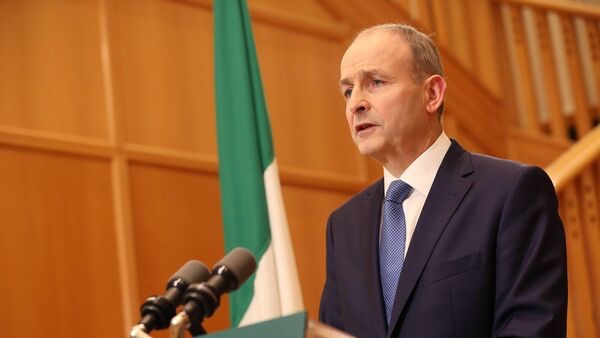
After weeks of vacillation and infighting, the Dublin government has responded to inexorably rising levels of the coronavirus in Ireland with a stringent, six-week ‘level 5’ lockdown.
The deeply unpopular move could, if successful, allow a high level of normality to be restored in time for Christmas -- but if not, it could threaten the stability of the three-party coalition.
Taoiseach Micheál Martin announced the restrictions that the 26 Counties will endure for six weeks, from Wednesday night. He put the onus on the public to abide by the new rules, declaring his government “cannot fight the virus alone”.
As with the first lockdown in the Spring, all non-essential retail outlets will have to close, as well as hairdressers, salons, gyms, museums and galleries. Pubs, cafes and restaurants will only be able to serve takeaway.
People will not be allowed to travel beyond 5km from home unless for essential purposes, with police will monitor and issue fines to those deemed to be breaching the restrictions.
People wil only be permitted to go within five kilometres of their homes for exercise, and will not be permitted to visit the homes or gardens of others anywhere. People will be allowed to meet up outdoors with one other household within 5km.
Weddings will remain limited to 25 guests until the end of the year, and funeral limited to just ten people. Schools and creches will remain open, however, and construction, manufacturing and top level sports will be permitted to go ahead if deemed ‘essential’. People are asked to work from home where possible.
Those living alone, parenting alone or vulnerable can have close contact with one other nominated household.
Meanwhile, the special Pandemic Unemployment Payment is to be restored to €350 a week, but only for those previously earning €400 or above, with lower payments for those on poorer incomes.
“We work to suppress the virus when it is growing and we work to reopen as much of our society and economy as possible when it is safe to do so. Until we have a safe vaccine, we must continue in that pattern,” Mr Martin said.
This is the reality, he claimed, in the rest of the world, but he acknowledged restrictions in the 26 Counties had been draconian in comparison with other states.
“Where are we now in that cycle? In the effort to suppress the virus, we have introduced what is probably Europe’s strictest regime.
“As a result of this, we can see some evidence that these restrictions have been effective in slowing the growth and spread of the virus.
“However, as these figures show, these restrictions on their own have not been enough to significantly reduce the levels of infection,” Mr Martin said.
Further action is now required, he insisted, as a potentially grave situation lay ahead otherwise.
A ‘zero Covid’ strategy of locking down the island and using the sea as a barrier to infection was “not an option”, he declared, and he said the so-called ‘herd immunity’ approach of allowing the disease to spread was also “non-negotiable”.
“I understand the sense of disappointment, loneliness and despair this announcement will bring. Even as the winter comes in there is hope and there is light,” said Mr Martin.
“If we pull together over the next six weeks we will be able to celebrate Christmas in a meaningful way,” he added.
In the past week, some 7,500 more people have tested positive for carrying the virus, and a total of 18 have died. The number currently infected in the 26 Counties is estimated at up to 50,000, while the numbers of patients in intensive care units is 34.
![[Irish Republican News]](https://republican-news.org/graphics/title_gifs/rn.gif)
![[Irish Republican News]](https://republican-news.org/graphics/title_gifs/harp.gif)

